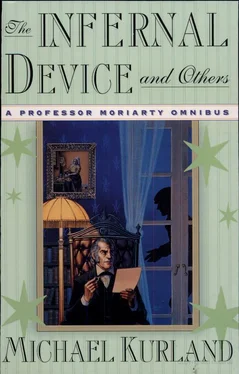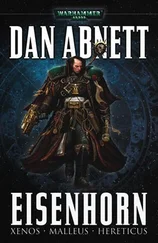"Good!" Moriarty called. "Now out, quickly, all of you!"
"Let us clean the place out," Colonel Moran insisted.
"Trust me, Colonel," Moriarty told him. "It shall be done. But you get the boys out of here and away — now!"
The habits of a military lifetime were too ingrained to permit argument. Moran barely resisted saluting. "Yes, sir," he said, and gathered his troop before him on his way back out the door.
"Let us get the ladies, Barnett," Moriarty called. "Quickly now!" He went to the door behind which they waited and shooed them into the hall like a mother hen.
Barnett paused at the cloakroom door and grabbed an armful of capes and overcoats, wrapping one around the shoulders of each girl as she passed out into the rain. Moriarty, after seeing them start safely out, darted back to the door of the large gambling room. "Quick!" he called to the house girls who were lounging about awaiting the return of the masked men. "Out into the street! No time to explain! The police are coming! Move — move!"
The urgency in his voice must have communicated itself to the women, because they boiled out of the room and joined him in a mad dash through the outer door.
Barnett stopped on the pavement about one hundred feet from the house to gather the young ladies in his charge. "Around the corner," he told them. "There's a carriage. We won't all fit—"
"I have a four-wheeler on the next block," Holmes volunteered. "It's a rotten shame, isn't it?"
"What?" Barnett asked.
"Whistling for a policeman would accomplish nothing. One or two bobbies could not prevent that assemblage from dispersing all over London. We'll be lucky to apprehend more than a couple of them. There's no way I can get a raiding party here from Scotland Yard in time to do any good at all."
"I wouldn't worry about it," Moriarty said, coming up behind them. He had his watch out, and was staring at the face.
"Why?" Holmes demanded.
"There is no time," Moriarty said, closing the watch and putting it away. "Get down!" he ordered. "All of us. Now! I just hope we're far enough away." He dropped flat to the pavement, and the others followed. Barnett did his best to shield Cecily from whatever was to happen.
The Mummer came running over. "What's happening, Professor?" he demanded, staring down at the group.
Moriarty's hand came up, grabbed Tolliver by the lapel, and pulled him down to the pavement. A second later the earth lifted and heaved, and a sound that was beyond sound filled the air. It seemed to go on and on, and then, abruptly, it stopped. For a few seconds longer there was a new sound, coming from all about them — the splattering, smacking noises of large objects hitting other large objects, or hitting the ground. And then that too died out.
Barnett lifted his head. Where the house had been there were now several fires. But — and this his mind did not grasp for a moment — there was no longer a house.
"Midnight," Moriarty said. "The start of a new day, and the end of the old. Let us go home."
TWENTY-EIGHT — THE GIFT
So she went into the garden to cut a cabbage leaf to make an apple pie; and at the same time a great she-bear, coming up the street, pops its head into the shop. "What! no soap?" So he died, and she very imprudently married the barber; and there were present the Picninnies, and the Joblillies, and the Garyulies, and the Grand Panjandrum himself with the little round button at top, and they all fell to playing the game
of
catch as catch can, till the gunpowder ran out at the heels
of
their boots.
— Samuel Foote
Barnett spent the better part of a day composing the letter. It was as short as possible, considering all he had to put into it. He rewrote it fourteen times, and each time was convinced that he sounded just as much like a stuff-shirted prig as the last time. Whenever he tried to lighten the tone, it sounded frivolous to him; and he would not sound frivolous.
Marry me, Cecily, the letter said. And then it went on to tell why. It spoke of love and understanding and mutual aid and trust. It touched on a woman's right to have a career, and how he understood, and was willing to honor that. (Prig!) It skirted the issue of complete independence for women by pointing out that although he most assuredly believed in it himself, that would change neither the laws nor the customs of Great Britain.
It was six pages long in his small script.
In the late afternoon he went over to Cecily Perrine's house. It was a week since the clubhouse had exploded, and Cecily had been confined to her bed for that time, tended by her father. The first three days of bed rest were for her health and recuperation. The last four were more for her father. The old man seemed to feel that her ordeal was somehow his fault, so Cecily stayed in for a few extra days to allow him to fuss over her.
Barnett came over every day, clutching some small idiotic present to his chest as he entered her room. This day he brought a potted plant, which he placed on the window ledge. Then he chatted politely with Cecily for two hours — afterward, he could not remember what they had talked about. As he got up to leave, he handed her the envelope.
"Read this at your leisure," he told her, "after I leave. It tells you how I feel. Somehow I'm afraid that if I try to do it in person, we will get sidetracked and have an argument, which is the last thing I want. Answer me when you are ready."
Then he shook her hand and left. The words that he had intended to add remained stillborn on his lips. He had practiced them, but he could not say them. He had planned to say that he, with this letter, was once more proposing marriage to her, and that if she turned him down this time he would have to stop coming by. Seeing her would become too painful.
That was what he had intended to tell her. But at the last moment he had lost his courage. Supposing she said no — she would probably say no — she had said no once before. Would he actually have the courage to walk away and no longer see the woman he loved? It was probably the wisest thing, but it sounded so final. Perhaps if he stayed around, someday he would ask her a third time, and that time she would say yes.
He shook his head as he walked away from the house. Never would he have believed that he could behave this way. Love, he thought, is an unstable, unkind, thoroughly demoralizing emotion.
-
Back at Russell Square, Moriarty was entertaining a guest. Barnett recognized the visitor as the Indian gentleman who had called himself Singh. "This house," the guest was saying as Barnett entered the study, "the explosion demolished it completely?"
"Utterly," Moriarty said. "My calculations indicate that there must have been at least two hundred pounds of gunpowder packed into the cellar. There was one fireplace standing complete from cellar to chimneypot, like an angry brick finger pointing at the sky, but all else was gone. Bits and pieces of the Hellfire Club were found a quarter mile away."
"How many bodies? The newspaper accounts varied."
"Twenty-six that they could be sure of."
Singh nodded. "Professor. Chardino believed in a vengeful God. A fascinating case, indeed."
Barnett looked curiously at the slender, dapper Indian gentleman, who turned and extended his hand to him as Moriarty introduced them. "Mr. Singh," Moriarty explained, "has come to arrange for the transportation of the treasure. It is being returned to those from whom it was stolen — spiritually, if not actually."
"Ah, Mr. Barnett," Singh said, taking his hand and shaking it briskly, "it is a pleasure to meet you. Allow me to commend you on how well you perform under stress."
Читать дальше












